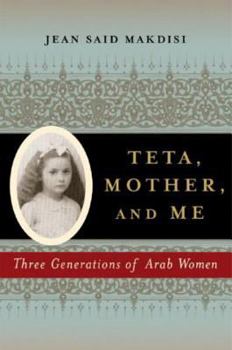Teta, Mother and Me: Three Generations of Arab Women
Select Format
Select Condition 
Book Overview
In this "beautifully written memoir" (Publishers Weekly), Jean Said Makdisi illuminates a century of Arab life and history through the stories of her mother, Hilda Musa Said, and her Teta, "Granny" Munira Badr Musa. Against the backdrop of the fall of the Ottoman Empire, the rise of Arab nationalism, the founding of Israel, the Suez crisis, the Arab-Israeli wars, and civil war in Beirut, she reveals the extraordinary courage of these ordinary women,...
Format:Hardcover
Language:English
ISBN:0393061566
ISBN13:9780393061567
Release Date:July 2006
Publisher:W. W. Norton & Company
Length:404 Pages
Weight:1.65 lbs.
Dimensions:1.4" x 6.9" x 9.4"
Customer Reviews
4 ratings
Nostalgia
Published by Thriftbooks.com User , 16 years ago
I grew up in Cairo and now living in the US. I loved this book so much and relate to every word of it. I would defintely recommend it to my son to read in the future as it is a beautiful mix of sociology, history and psycology.
Arab Women
Published by Thriftbooks.com User , 17 years ago
The social history and politics of Arab women illustrated by the author's love for her mother and grandmother.
memoir tells the story of three generations of Arab women
Published by Thriftbooks.com User , 18 years ago
Makdisi's memoir carefully collects fine details of the Arab Christian history in Syria, Lebanon, Palestine and Egypt. In tracing her mother and grandmother's and her own personal story and the families that surrounded them, Makdisi takes the reader on a journey that shows the meaningfulness of geographical origin in the arab culture as well as the inherent ability to change, transform and relocate. This memoir presents an opportunity to encounter in a very human way the event of the partition of Palestine and its effects on families' lives. It is broad in scope touching on everything from questions of class, the situation of women, colonialism, raising a family in a time of war, social movements and the upheaval of governments, being stateless, suffering loss... This book is recommended to the patient reader who is serious about garnering a deeper understanding of this area of the world or the related subject matter in women's studies. It is worth noting that Makdisi is the sister of Edward Said. I didn't realize this myself until many many pages into the book.
A personal view of history through the eyes of family and change
Published by Thriftbooks.com User , 18 years ago
The impetus for this lively, emotionally engaging exploration of three generations in Makdisi's maternal line came from her conflicted feelings about feminism and the traditional domestic-centered woman's role as well as the friction between the two cultural influences in her life - East and West. Her father was an affluent Christian Palestinian who immigrated to the US and became an American citizen. He returned to Jerusalem to honor his mother's dying wish, "but never really forgave her for deflecting him from what he had seen as his destiny in the New World." Her mother was Lebanese and Palestinian, the daughter of a strict Baptist minister and his European-mission educated wife (Teta) who was, in turn, daughter of an Evangelical pastor. Makdisi and her siblings (which include the late Edward Said, professor, writer and pro-Palestinian activist, and the historian and writer Rosemarie Said Zahlan, who was also a pro-Palestinian activist) grew up with American passports, though she was born in Jerusalem in 1940 and grew up in Cairo. "Until 1948, and the Palestine war, our family moved regularly between Jerusalem and Cairo. For Palestinians, the year 1948 was a time of movement, of scattering, of families breaking up and moving apart. It was a time of breakdown, of entropy." Though a child and sheltered somewhat from outside events, she recalls the upheaval in their Cairo home as a stream of relations - distraught refugees - moved through. "In 1948 the heart of our family was torn out, and the centre of our existence was broken....It is only recently that I have come to understand how deeply affected we have all been by the Palestinian experience, how we have lived our lives in its shadow. Most of all, though we have lived well and done well and accomplished much, though we have made many deep friendships throughout the world, since 1948 we have been outsiders - not only my parents, but their children, and, I fear, their children's children as well." Makdisi does not dwell on "the Palestinian experience" in this book, which is as much biography and history as it is memoir, but its long shadow is always visible. As she moves backwards and forwards in time, she describes an arc - a move towards an ideal of "modernity," synonymous with westernization, that carried her grandmother and mother farther from the extended family that gave women support and strength into an isolated role in the nuclear family. This movement began with the values her grandmother absorbed in the mission schools and culminated in her own marooned existence in an affluent Washington DC suburb, frustrated, bored and conflicted between her role as perfect mother and housewife and her ambitions to be something in the world. A century-long embrace of Western culture is clearly to blame in her mind, though Makdisi certainly does not advocate a repudiation of all things Western. Instead she concludes her book with a call for a new synthesis of priorities, which combines the






